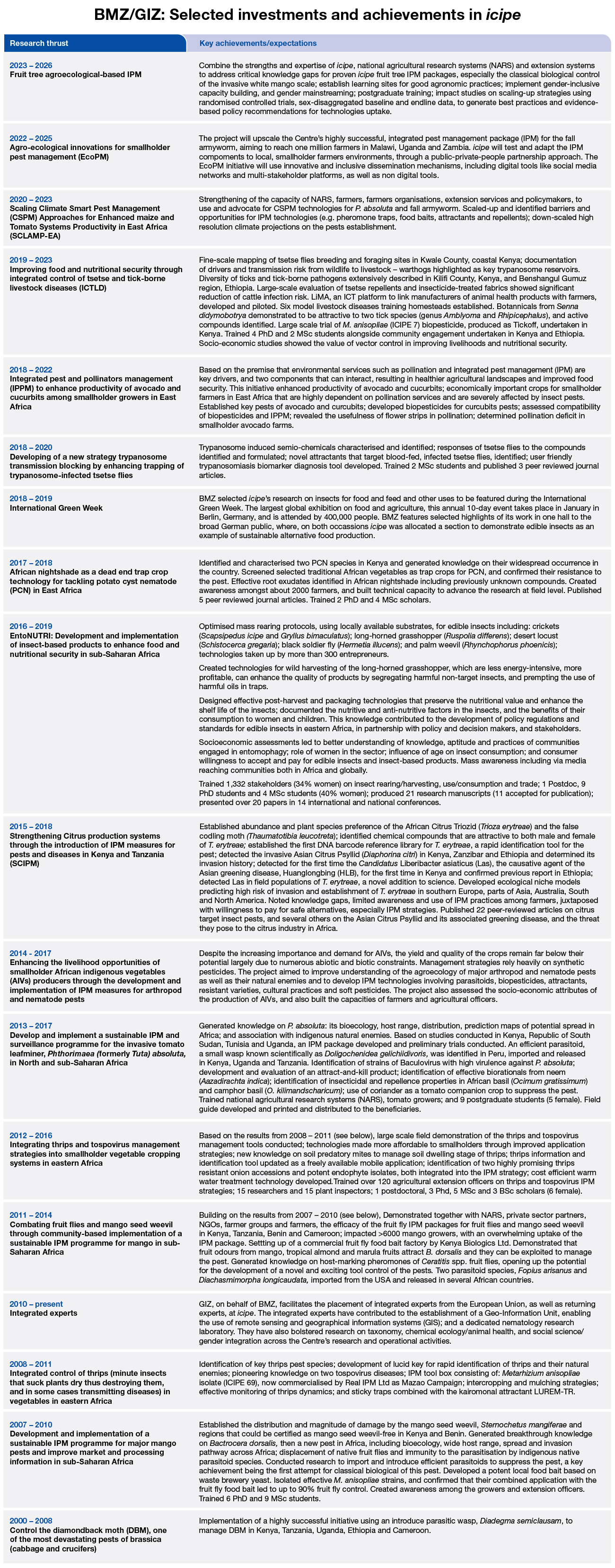BMZ/GIZ to provide core funding to icipe, building on a solid partnership and a vision of innovations for socio-economic transformation in Africa
On behalf of the German Federal Ministry for Economic Cooperation and Development (BMZ), the Deutsche Gesellschaft für Internationale Zusammenarbeit (GIZ) has signed an agreement with the International Centre of Insect Physiology and Ecology (icipe) to provide the institution with annual core funding for the period 2023 – 2025. The agreement, which is commissioned by BMZ and administered through the Fund International Agricultural Research (FIA) of GIZ, builds on more than two decades of partnership between Germany and icipe.
“Germany has a long history of supporting international agricultural research for development, and icipe is a key component of this vision. The Centre’s innovations, which are grounded in high quality science, are environmentally, socially and economically sustainable. They improve food and nutritional security and livelihoods in Africa, while protecting the environment and the biodiversity.” – Dr Stefan Kachelriess-Matthess, Senior Programme Manager, FIA/GIZ.
He added: “icipe advances Africa’s capacity to address challenges, including climate change, with urgency and the capability to do so at-call. Indeed, icipe continues to exemplify return of investment in insect science, as a way of building and securing Africa’s prosperity.”
The previous contribution by BMZ/GIZ to icipe has helped to find solutions to a range of crop pests and livestock disease vectors; and to protect and exploit beneficial insects, for food, feed and other uses, and for ecosystem services such as pollination. These initiatives have been underscored by the capacity development of researchers, end-users and stakeholders. (*See page 2 and 3 for detailed information)
The support has also boosted policy research, an important area that is key to creating an enabling environment for innovation ecosystems and for strengthening food systems governance. These investments have elevated icipe’s ability to provide knowledge-based advice to policy and decision-makers, and to partner with private sector actors, to develop, regulate, create awareness and commercialise high-quality, innovative products. Moreover, the German Academic Exchange Service (DAAD), has steadfastly supported icipe’s capacity building efforts, especially through the African Regional Postgraduate Programme in Insect Science (ARPPIS).
“icipe believes that amidst many obstacles, the opportunities for development in Africa are enormous and that the continent is well-poised to exploit them. We gratefully welcome the new agreement with BMZ/GIZ, which builds on a solid foundation. It also safeguards the Centre’s capacity for innovation, which in turn, helps to harness Africa’s vast resources and advantages, for socio-economic transformation.” – Dr Segenet Kelemu, Director General & CEO, icipe.
The core funds will advance icipe’s research and development activities in two key areas, the first being on stingless bees in Africa, and their potential to ecosystem services and job creation. Stingless bees are renowned for their high-value honey and affiliated products, as well as superior pollination services. Over the recent past, icipe has amassed knowledge on this fascinating, important and largely unexplored resource in Africa. New studies will increase understanding of the biology of stingless bees, their domestication and services, and facilitate the design of holistic, inclusive value chains for product commercialisation.
The second area of research is on sustainable camel production and resilience in East Africa. Against the background of climate change, the camel (Camelus dromedarius), is often referred to as the “animal of the future”, due to its hardiness and adaptability in arid and semi-arid areas. Through participatory research, icipe will build on the Centre’s recent research to improve the control of insect borne diseases in camel. A range of environmentally safe products are envisioned to manage biting flies and ticks, which transmit disease causing pathogens to camel. Also, icipe’s novel discovery of a non-invasive, urine-based diagnostic protocol for trypanosomiasis, will be translated into a commercialisable tool for judicious treatment of the disease in camel.
BMZ/GIZ joins a list of icipe core donors that includes: the Swedish International Development Cooperation Agency (Sida); the Swiss Agency for Development and Cooperation (SDC); the Australian Centre for International Agricultural Research (ACIAR); the Norwegian Agency for Development Cooperation (Norad); the Federal Democratic Republic of Ethiopia; and the Government of the Republic of Kenya.


